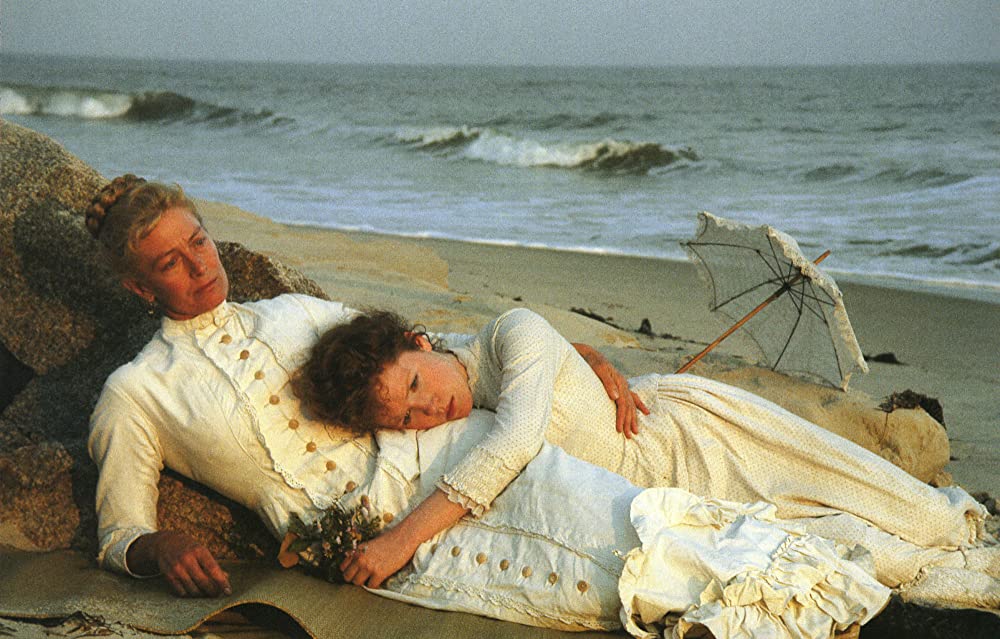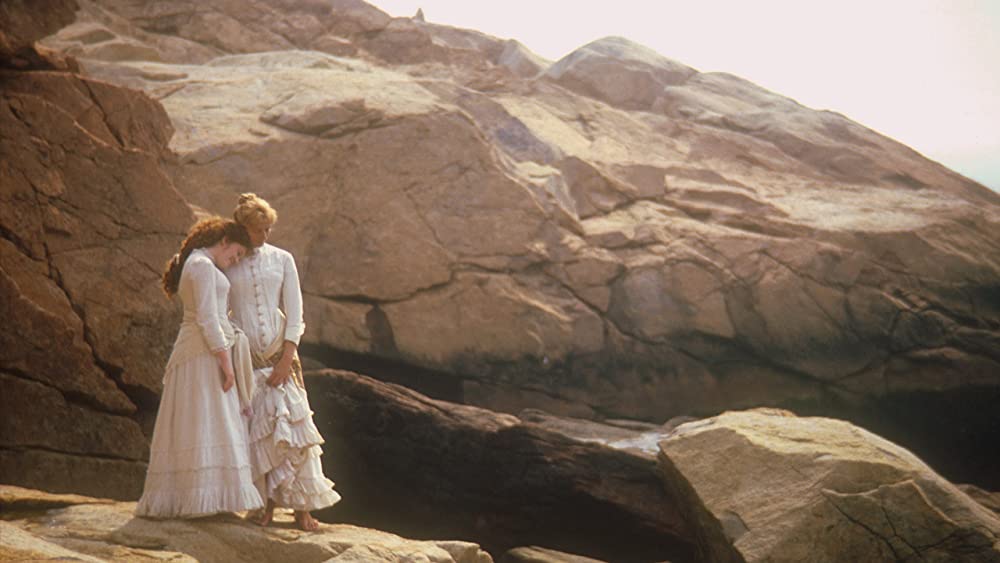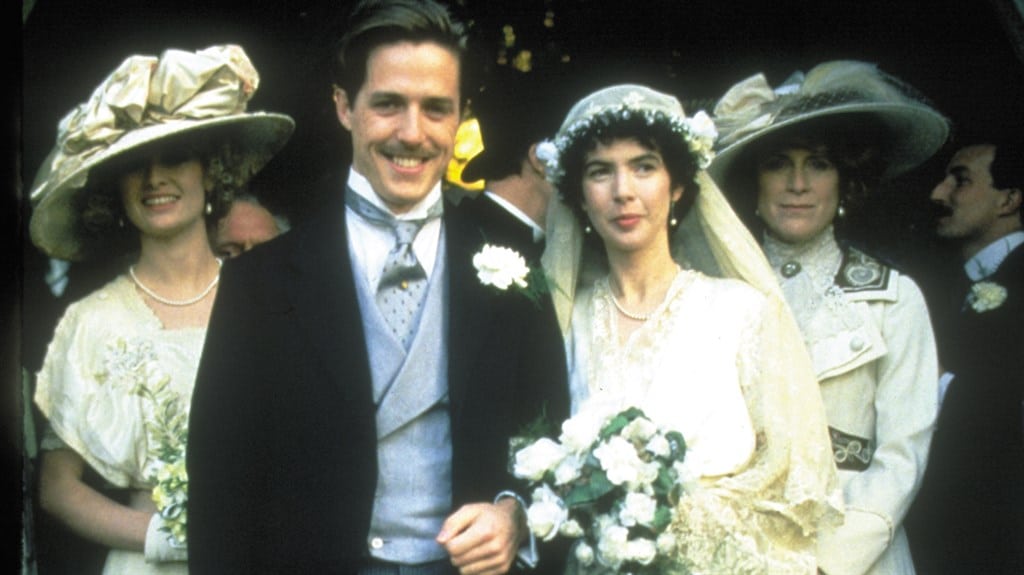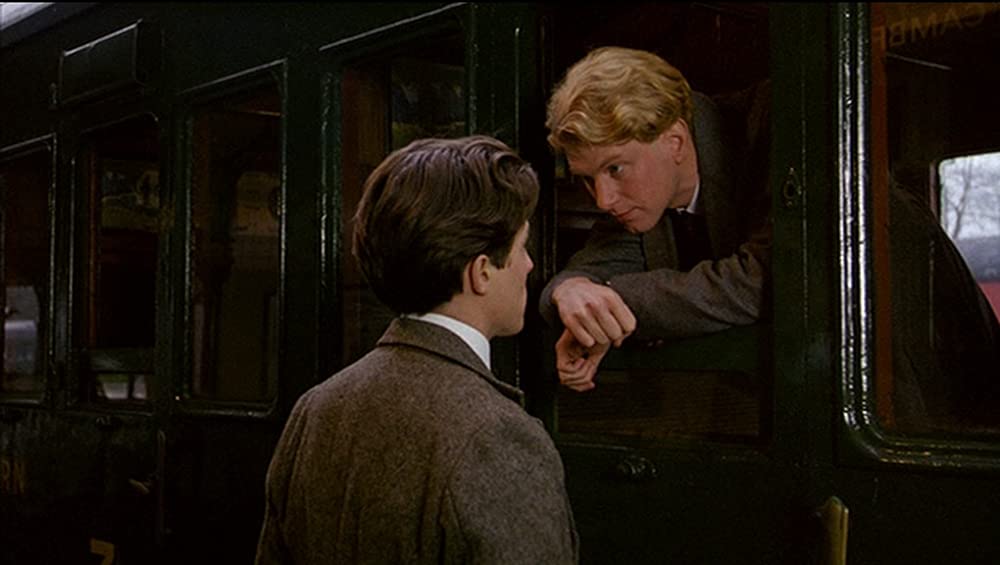KinoKultur is a thematic exploration of the queer, camp, weird, and radical releases Kino Lorber has to offer.
The late nineteenth and early twentieth centuries are major turning points in queer history. It’s a time when “queerness” and “homosexuality,” as we know them today, were just starting to take shape in the Atlantic world later to be exported and/or enforced all over the world. Currently available on KinoNow are two Merchant Ivory films that transport us back and help us experience the complex lifenexus queer people of the past had to navigate everyday without the modern notions of Queerness or a Queer Community.
With their keen eye for historical construction director James Ivory and producer Ismail Merchant infuse The Bostonians (1984) and Maurice (1987) with a complex understanding of the queer past, one that is equally fascinated with the near future as it is with the ancient past.
Ruth Prawer Jhabvala opens her adaptation of Henry James’ The Bostonians with a left hook. Olive Chancellor (Vanessa Redgrave) is giving an impassioned feminist appeal to a terrified male passenger in her coach. It’s 1870s Boston and she believes it’s time for a new kind of woman to burst into public life, one with rights and independence. The rich southern passenger is a distant cousin, the perfectly named Basil Ransome (Christopher Reeve), and he’s less than convinced. He’s come north to find an obedient and childbearing wife and is certainly, post-Civil War, not interested in giving away any more rights to any more people.
They’re both attending a lecture sponsored by spinster socialite Seneca Falls suffragette, Ms. Birdseye (Jessica Tandy). The lecture features a young lady, entranced by mesmerism, speaking profound prophecies about the emancipation of “the female sex.” This bright young woman, Verena Tarrant (Madeleine Potter), soon becomes the idol of affections for both Basil and Olive and what ensues is a delicious, if somewhat briney, love triangle that forces all involved to reconsider their emotions and ideologies.
Vanessa Redgrave will absolutely knock the wind out of you, as she is wont to do, bless her. And it’s vital that she does so. We’ve seen films about feminists being torn between tradition and independence; Olive’s presence in the love triangle is what makes The Bostonians unique as a historical drama.

Her position is far more fraught than Basil’s, who has the advantage of the social straightaway. Redgrave’s skill is being able to render a visibly caged interior life for Olive who is constantly living in code. There’s an urgent descant to her delivery that cues us to what Olive is not saying and what she really wants to say. Olive says she wants to “know” Verena and Redgrave is able to say it with multiple meanings at once. She has, in essence, learned two scripts, one spoken and the other unspoken.
The most legible code in which The Bostonians and its characters talk through queerness is the reference of the ancient past. As Olive and Verena grow closer, Olive takes on a literally Sapphic role as a pederastic mentor who even reads ancient same-sex love verses. Their intimate friendship is based on an extension of their ideas about the liberation and appreciation of the female body.
Like real queer people living at the end of the nineteenth century, their queer romance is not based on a recognized mutually shared identity, based on same-sex desires; no one in this film is a “homosexual,” but something rooted in more pre-capitalist forms of same-sex intimate relationships which class, apprenticeship, and age were all a much larger factor than “orientation.” Verena aptly fits the role of the ancient beloved who forms a deeply personal and often sexual bond with an older mentor.
We’ve seen films about feminists being torn between tradition and independence; Olive’s presence in the love triangle is what makes The Bostonians unique as a historical drama.
Olive is at once part of the past and looking towards the future. As one society woman suggests, Olive has a history of “discovering” women and taking them tightly under her wing. There’s language about Olive “converting” or “opening” women to the cause, but this comes with it’s own double speak. She’s the older mentor and social superior who initiates and guides the youthful beloved into a new life of spiritual and physical maturity.
Yet, as expressed earlier, Redgrave’s Olive has a new sense of urgency that is searching for someone similar to herself. She is a nod forward to the women in “Boston Marriages,” women who were joined in a largely visible coupling. Olive can sense she’s not like other women; sadly, she eventually realizes Verena isn’t the same, but she doesn’t give up searching for others like her. Her moment in queer history must wrestle with if and how queer people are deserving of Romantic Love, which at the time was changing intimate relationship and marriage models around the world at the time.
The brilliance of The Bostonians is that it captures a moment when many important social constructions were in flux, like gender and sexuality. Instead of a one directional perspective on the repression of queer people and desires, Jhabvala and Ivory smartly give us a spectrum of perspectives on queerness. They add a third queer position, that of the androgenous Dr. Prance (the inimitable Linda Hunt) the physician.

Though she knows the “truth about both sexes,” even their queer desires, she, like Basil Ransom, believes women have a naturally subservient position. Her position, as a scientist interested in the proper categorizes of gender, reflects the scientific rationalism that will ultimately define and conform queer intimate relations into the category of “the homosexual” or “invert.”
Jhabvala and Ivory show a world that’s constantly changing. Though the encroaching years would see more oppression of queer people, they also were years where it was increasingly easier to identify and find other queer people. So while Verena ultimately chooses a different path than her, we can’t fully blame her. With increasing visible opposition to queer people and the hardening primacy of family unit, it’s easier and safer to with Basil.
Yet, for all this, there’s still a chance for Olive. As she takes the stand at the end of The Bostonians, her bold speech is about the hard yet hopeful possibilities of the future.
And those possibilities are realized in Maurice, more or less. Adapted from E.M. Forster’s posthumous semi autobiography, Maurice, is set in England beginning in 1909, just a few short decades after the era in which The Bostonians takes place.
But by this time, a much stricter self and social regulation of queerness has crystalized. There are more laws regulating/restricting the queer’s public and private worlds. Yet, along with this came a greater sense social recognition amongst queers, especially queer men. There were “homosexuals” now but they were also “criminals.”
Set against this background is the coming-of-age story of Maurice Hall (James Wilby). While at Cambridge, he finds himself in a philosophical clique with two men with whom he senses he might share more than similar academic interests. Lord Risley (Mark Tandy) is a flamboyant and reckless aristocrat, but Clive Durham (Hugh Grant) is a more refined gentlemanly sort of lad with devilishly good hair.

The two form a bond that eventually reaches an amorous point where they can no longer deny their feelings for each other. But Clive will never cross the line to sexual intimacy. He’ll marry someday and having to end things with Maurice would hurt too much. He has a professional career to consider and the increasing surveillance around homosexuality puts too much at risk.
Such heartrending decisions hurt because Wilby and Grant have such believable chemistry. Grant gets to showcase the bad lad charm he’ll become famous for and Wilby brings a tender conflictedness similar to Redgrave in The Bostonians. He too knows there’s something different about him but has very few words to describe it and the words he does have are not treated lightly or kindly.
Maurice depends on us sympathizing with the main character, and Wilby’s earnestness is able to draw us in right away. We, as modern viewers, know the future he is struggling towards and can see it in his eyes or the way he leans in to suggest more to his sentence. We want him to be free to live openly.
Such heartrending decisions hurt because Wilby and Grant have such believable chemistry.
But consequences of public or visible queer acts become all too apparent when Lord Risley is convicted of solicitation after being set up by a soldier and sentenced to hard labor. This is post Oscar Wilde’s trial. Aristocrats getting tried for giving into their “baser” and “low class” instincts was the public mania du jour.
After Clive follows through on his plans to marry and settle into professional life, Maurice, realizing his heartbreak has deep significance, sets off on a quest to cure himself. Maurice tries to see a physician who dismisses his concern as passing and due to a lack of will. He even tries hypnosis. Nothing works. He returns to England and Clive, changed but uncured.
While he’s staying with Clive, Maurice realizes he’s caught the eye of Alec Scudder (Rupert Graves), the handsome gardener. Since Alec is off to Argentina soon and has a baby face that’s too cute for words, Maurice finally gives in and allows himself a night of somewhat onscreen passion. When he wakes and is given a note asking him to meet Alec in a secluded boathouse, Maurice assumes it’s blackmail and begins to accept that his life is about to unravel.

Covering years in the crucial first two decades of the twentieth century, Maurice shows us just how society had changed with regards to queer couplings and communities just 30 years or so after Olive. There is an attempt to find a more scientific explanation, though the spiritual or parascientific are still consulted. Queerness is once more harshly repressed, yet also more clearly legible.
These changes are clearly charted in the ways Maurice also refers to the ancient past. The time in which the film takes place was an important time of drawing on the ancient mediteranean cultures for nations and queers. Students like Maurice and his cohort were expected to learn the Greek and Roman classics in order to be considered refined gentlemen of society.
The Ancient World represented the goals and lessons of civilization. They were also the sources used to argue for the innateness and worthiness of queer desire and pairings. Thus, the Ancient World became a highly fraught and contested subject and metaphor. When considering where to go on holiday, it’s made very clear that Greece is not an option for the boys.
Covering years in the crucial first two decades of the twentieth century, Maurice shows us just how society had changed with regards to queer couplings and communities just 30 years or so after Olive.
Maurice and his circle are expected to read and know Plato’s Symposium, but when the queer passages come up, they’re censured and dismissed as an aberrant depravity. Sadly, this castration is reflected in Clive’s psyche as well. His understanding of his sexuality and desires reflect the violent desexualization of ancient mediterranean intimate male relations that he’s learning in school. For him, the Greeks and his queerness are right and good, but misguided and far from pure.
Fortunately, things turn out well for Maurice. He finds self acceptance and self identification at a time when society was turning its back on people like him. At the end, Maurice and Alec risk legal punishment in living their life openly, but they also have a chance of finding other couples like themselves and forming a culture around their shared identity. They find the most radical thing few, especially men like them, could have dreamed of: love. And it’s no coincidence that it is realized in front of ancient marbles.
Both The Bostonians and Maurice are about interesting moments in queer history and are themselves interesting entries in queer film history as well. Olive’s story is about a queer person in between social and self identity, a looking forward to a queerness that is not-yet-here. Maurice is similarly about a personal and national coming into queerness, but it’s notably not a coming-out-story.
Merchant Ivory films are known for their historical detail. Often this praise comes in the form of acclaim for their costume and production designs. And those are all there in these films. But what The Bostonians and Maurice demonstrate is an interest and precision in the details of the historical spirit as well. They are meticulously executed lessons that help us sense and experience the trajectory of queer history as it was learning from its own ancient past.